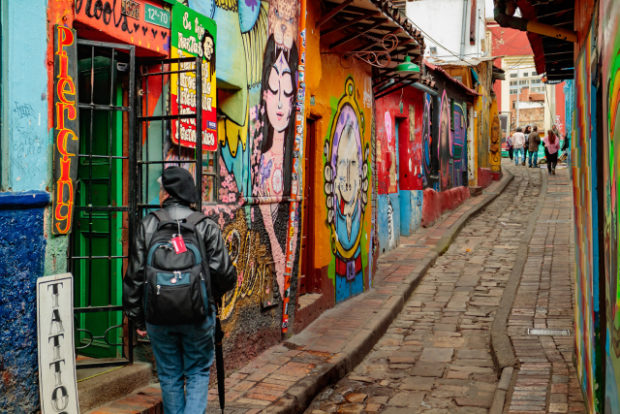
Among the top emerging destinations for LGBT travelers is Colombia. Image: AFP/Devasahayam Chandra Dhas
From gay-friendly honeymoon destinations to party escapes, tourism has long catered to LGBT travelers.
But as acceptance grows, so do calls for the industry to broaden its offers, and avoid clichés.
All too often travel professionals remain stuck on stereotypical views of lesbian, gay, bisexual and transsexual guests as hedonistic holidaymakers, Thomas Boemkes of the consulting agency Diversity Tourism said at Berlin’s ITB fair, the world’s largest travel trade show.
“Hotel owners still ask me how to be gay friendly, and if for example they should be offering condoms,” Boemkes told AFP.
“I tell them all they have to do is be tolerant and welcoming, as you would be with any other clientele, without being intrusive,” he said, adding that “it is appreciated” when reception staff ask two male guests whether they would like twin rooms or a shared bed.
The World Tourism Organization estimated in a 2016 report that LGBT travelers account for five to 10 percent of global tourists.
It describes them as a group “that travels with greater frequency and demonstrates higher-than-average patterns of spending,” making them and their so-called “pink dollars” welcome visitors in many countries.
“It is less typical for gay travellers to have children, and they do have more money and time to travel,” said John Tanzella, head of the International Gay and Lesbian Travel Association (IGLTA).
LGBT tourism has exploded since it burst into the scene more than four decades ago, when a US travel firm offered the first gay-only tour of the Grand Canyon in 1973.
Ten years later, the US-based IGLTA was founded and today is among the most prominent exhibitors at the influential ITB trade fair — evidence of a sector in full expansion.
Over the years, many cities around the world have cultivated a reputation as LGBT-friendly vacation spots, like Berlin or Barcelona — whose buzzing Eixample district has been dubbed “Gayxample”.
It’s destinations like these that Juan Julia has targeted for his chain of Axel Hotels aimed at LGBT travelers. “It means a place where you feel free, welcome, inclusive, you can meet with the local community, like a sanctuary,” he told AFP.
And inclusion goes both ways. “We are also straight-friendly,” he added.
Off the beaten track
But although some hotspots remain perennial favourites, the community is increasingly looking to expand its horizon.
More countries are becoming “safer and welcoming,” Tanzella said, allowing intrepid LGBT travelers to escape “the gay bubble effect” and explore previously hidden gems.
Among the top emerging destinations is Colombia, which Tanzella described as already “very well-known in our community, with plenty of gay dance clubs.”
“Colombia is very much forward-thinking,” he said. “And the entire country is beautiful.”
From surf lessons in Brazil, a guided tour of the Tel Aviv start-up scene or yoga retreats in Thailand, travel operators are falling over themselves to court the affluent LGBT traveler.
By far the most popular packages are those linked to weddings and honeymoons, driven by the legalization of gay marriage in nations around the world.
At the ITB fair, tourism officials from California were among those actively trying to woo same-sex future newlyweds, hoping to hear cash tills ringing as much as wedding bells.
A 2015 survey by Community Marketing found that the main criteria for LGBT tourists were quality, price and location — the same as for heterosexual travellers. LGBT families with kids meanwhile put child-friendly accommodation at the top of their list.
But alongside the booming business of LGBT-friendly tourism, the Berlin tourism show also shone a light on tour operators offering a different type of holiday, aimed at taking a stand in places still hostile to gay, bisexual, transsexual or transgender people.
Tanzella said his travel federation had created a foundation to help “emerging LGBT destinations in difficult contexts,” and sponsors small gay pride parades in countries where the community is working to find more acceptance.
In Uganda, where homosexuality is illegal, Tanzella said the federation had a local member, “a very brave guy”, who was trying to encourage LGBT travel.
“Uganda is one of the most homophobic states in the world,” said Tanzella. “But he is doing great and we are helping him. We also want to see the gorillas.” CC
RELATED STORY:
LGBT tourism services eyed for growth prospects in China